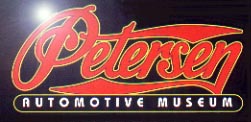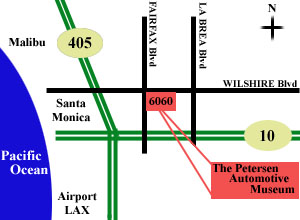
Million Dollar Cars
The World's Most Valuable Automobiles
An assembly in excess of $ 100 million in value will offer a close-up look at many of the rarest,
most significant, most beautiful and most sought after automobiles in the world today - some of
automobiles in the exhibit even have an individual value of more than 10 million.
|
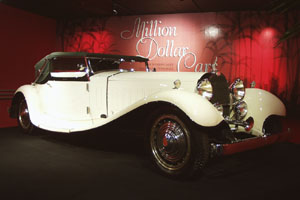
1931 Bugatti Type 41 'La Royale' Cabriolet
with coachwork by Weinberger of Munich -
the only 'open' one of the six ever produced. |
1931 Bugatti Type 41 La Royale
The La Royale - or Type 41 - was the top-of-the-line Bugatti, intended for heads of state
and Royalties. But of the six chassis produced, none was sold to the original target audience. Three
even remained with the Bugatti family for many years before being bought by collectors.
This particular La Royale was delivered new to Munich, Germany, to receive a
special Cabriolet coachwork by Ludwig Weinberger, making it the only 'open' bodied
Type 41.
In 1937, the Bugatti came to the USA, were it must have been used for several years. In
1947, it was discovered by Charles Chayne - the future vice president of General Motors -
sitting in a New York junkyard. He restored the La Royale to original condition and
since 1958 it is part of the Henry Ford Museum in Dearborn, Michigan.
|
|
1939 Maybach SW 38 Special Roadster
The Maybach marque was not only the most prestigious German automobile at that time, but also
featured advanced technology like independent suspension and double overdrives - resulting in 6 or
8 speed transmissions. The Zeppelin models even were equipped with 12-cylinder engines, which had
their ancestry in the power plants propelling the famous airships.
This particular Maybach SW 38 Special Roadster is one of only two built by Spohn
of Ravensburg, Germany - who did the coachwork for most of the Maybach automobiles -
and the only known to have survived. After the war, it served in the motor pool of the US Army before
being shipped to Florida. After many years of storage, it was brought back to original
condition in 1997 and debuted in Pebble Beach that year.
|
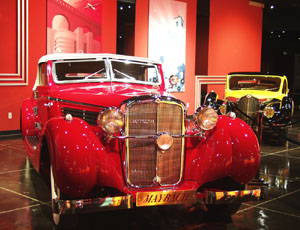
1939 Maybach SW 38 Special Roadster
one of two produced and the only one known to exist.
|
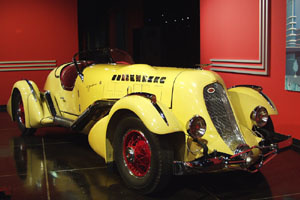
1935 Duesenberg SJ Special -
the 'Mormon Meteor'. |
1935 Duesenberg SJ Special Mormon Meteor
Fred and August Duesenberg were the creators of the most prestigious
American automobiles ever produced. The model J was powered by a straight-eight engine with
two overhead cams and four valves per cylinder, which produced 265 horsepowers. The SJ, equipped
with a supercharger, developed 320 horsepower - enough for speeds in excess of 120 mph.
In 1935, the first of three Mormon Meteor was built to produce a new world speed record.
Several modifications increased the output to 390 horsepower. In 1936, this particular Mormon Meteor
- driven by Ab Jenkins - reached a top speed of more than 160 mph on the Bonneville Salt
Flats. Covering a distance of 3,253 miles in 120 degree temperatures, he set a 24-hour average
speed record of 135.57 mph and a one hour average top speed of 152.145 mph. Both records remained
unchallenged for many years.
|
|
1939 Mercedes-Benz W 154 Grand Prix
This Mercedes-Benz W 154 Grand Prix race car
was the sucessor of the W 25 and the W 125, and was constructed as a response to the changed formula in
Grand Prix Racing for 1938 to 1941, which limited the volume to 3 litre for supercharged engines.
The W 154 debuted in 1938 with a twelve-cylinder engine of the type M 154 - featuring
two superchargers and a setup for a Bosch fuel injection - even so it was only raced with
carburetors. The output was up to 450 horsepower. Compromised reliability at high rpm required extensive
modification in the basic design of the engine, leading to the new designation M 163 for the 1939
Grand Prix season. Equipped with the modified engines with an increased output of up to 480
horsepower, the W 154 finished the Swiss Grand Prix - the last before World War II -
with first, second and third place.
|
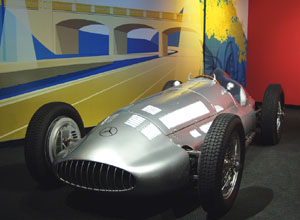
1939 Mercedes-Benz W154 Grand Prix Race Car
equipped with a M163 12-cylinder engine.
|
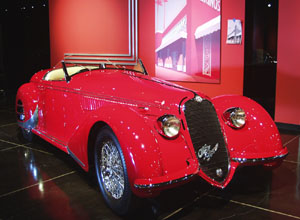
1937 Alfa Romeo 8C 2900B Spider
With coachwork by Carrozzeria Touring. |
1937 Alfa Romeo 8C 2900B Spider
With it's race-ready eight-cylinder engine - featuring double-overhead cams and twin superchargers -,
revolutionary chassis with independent suspension and stunning coachwork, the
Alfa Romeo 8C 2900 was considered the ultimate sports car of it's time. Carrozzeria Touring
created most of the 8C 2900 bodies and their design is considered the most beautiful among the
less than forty examples produced. Uniquely slotted spats over the rear wheels, a windshield without
top frame, slots surrounding the radiator, and a narrow body are the most prominent cues of the
Carrozzeria Touring spider.
Unfortunately the majority of the Alfa Romeo 8C 2900 has been re-bodied, salvaged or modified over
time - only a handful survived intact and in original condition.
|
|
1937 Mercedes-Benz 540 K Special Roadster
Even so there were a total of 25
540 K Special Roadster produced - this might the Million Dollar Car par excellence.
Highly recognizable, of unparalleled beauty for a mere production automobile, mostly owned by VIP's
or celebrities, it was desired by collectors ever since the end of World War II, and reached record
prices and interest whenever one changed ownership or came up for auction.
This particular example was the 1937 Berlin Motor Show exhibition Special Roadster,
and was purchased at the show by Jack Warner - boss of Warner Brothers. When it was auctioned
off in January of 2002, it was considered one of the most original examples of the six 'long tail'
versions, featuring the covered spare wheel. Nevertheless, it underwent a sensible restoration to
reach the level of perfection, which this magnificent automobile deserves.
|
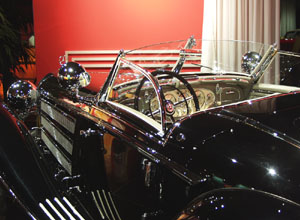
1937 Mercedes-Benz 540 K Special Roadster
originaly owned by movie producer Jack Warner.
|
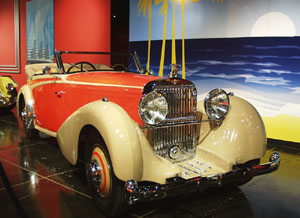
1934 Hispano-Suiza Type 68 J12
With coachwork by Vanvooren of Paris, France |
1934 Hispano-Suiza Type 68 V-12
Another great marque in automobile history - Hispano-Suiza - offered advanced, powerful,
luxurious, and very expensive automobiles to discriminating European clients. Founded in Spain
in 1904 by Swiss designer Mark Birkigt, the company relocated to Paris, France in 1911
to concentrate on the French market - leaving the Spanish factory producing the lower end chassis until
1938.
The Type 68 was a magnificent V-12 of first 9.4 litre, and later 11.3 litre volume -
introduced in 1931 at the height of the depression. It was powerful enough to accelerate most of the
custom coach built automobiles to a speed of 60 mph in around or under 10 seconds. Power brakes were
already standard on the Type 68.
Hispano-Suiza ceased automobile production in 1938. After World War II the company
experimented with front wheel drive and Ford V-8 engines but never went into production
again.
|
|
1939 Delahaye Type 165 Roadster
Even more amazing than the striking beauty of this Delahaye T 165 Roadster
is it's history. Designed by Figoni & Falaschi to be the show car for the 1939 New York
World Fair, the automobile could not have been equipped with a functioning 12-cylinder engine
in time. In it's place, an empty core was installed, and the designated engine stayed in
Paris.
Because of the beginning of World War II,
the automobile remained in the USA after the show. It sold subsequently and the buyer
installed a V-8 of american provenance.
In 1981, the Delahaye was found in a very sad state of decay in Fresno, California.
Many parts were missing - including the dashboard and instruments. By pure
coincidence, one of the rare 12-cylinder Delahaye engines had surfaced in Germany.
It turned out to be the exact engine, which was destined for installation back in 1939 - allowing to
finally unite it with the vehicle and to complete the restoration to the original built sheet.
|
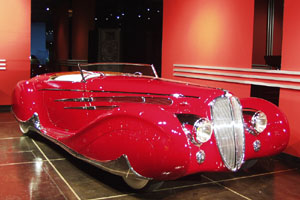
1939 Delahaye Type 165 Roadster
with coachwork by Figoni & Falaschi.
|
The exhibit will be at the Petersen Automotive Museum until January 2003.
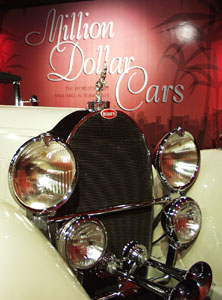
|

